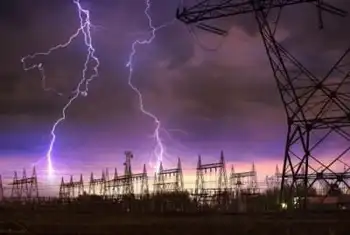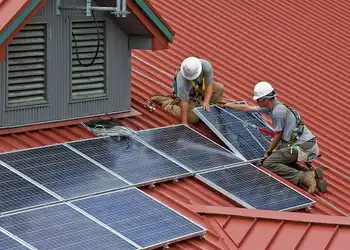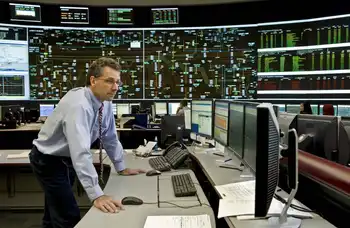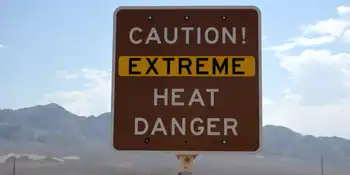Canada needs to kick its dirty oil habit
ALBERTA - Canada has become an oil junkie, hooked on the tar sands and in desperate need of detox.
That's a perspective put forward in a new book by Alberta journalist Andrew Nikiforuk in Tar Sands: Dirty Oil and the Future of a Continent.
The book is likely to be lauded by environmentalists and pilloried by folks in Canada's oil patch.
The author argues for a reopening of the North American Free Trade Agreement to enable Canada to reclaim its resource from a ravenous customer and partner in crime, the U.S.
Writes Nikiforuk: "Canada has adopted a new geodestiny: Providing the U.S. with bitumen."
He notes that while Canada furnishes the Americans with 20 to 30 per cent of their oil, half of this country's own citizens, in Quebec and Atlantic Canada, continue to rely on insecure supplies from the Middle East.
Accordingly, a vast network of north-south pipelines and electricity corridors are being built across the continent — to serve U.S. interests.
Nikiforuk disapprovingly cites NAFTA provisions that guarantee the U.S. unlimited access to Canadian oil and natural gas, and reasonable access during times of shortages.
These guarantees, he says, need to be renegotiated to allow Canadians to safeguard their domestic energy security.
Canada's official policy, of course, is quite different. Alberta's government regularly lobbies Washington to ensure its oil exports remain unimpeded.
When the U.S. Energy Independence and Security Act became law last December, limiting dirty oil imports, Edmonton and Ottawa immediately began lobbying for a tar sands exemption.
The Harper government has signalled it hopes to use American reliance on tar sands oil as a way of conveying to the new Obama administration Canada's strategic importance.
Nikiforuk believes the tar sands should be developed gradually and with far greater environmental sensitivity, a view that has been supported by former Alberta premier Peter Lougheed.
Nikiforuk paints a picture of the current development as an environmental cesspool.
In fact, every barrel of bitumen from the tar sands produces on average three times more C02 emissions than a regular barrel of oil.
The tar sands are Canada's single largest growing source of carbon dioxide, and by 2020 will account for no less than 16 per cent of the nation's total emissions.
Meanwhile, "no comprehensive assessment of the megaproject's environmental, economic or social impact has been done."
Approvals are granted enthusiastically as part of a process that seeks to maximize potential profit, says the author.
And there's where the rubber hits the road; the tar sands have been wildly profitable. How can we realistically expect the politicians to voluntarily turn off the spigot?
Between 2000 and 2020, it's estimated that corporate taxes from the tar sands will yield $44 billion for Alberta and $51 billion for Ottawa.
The Alberta Energy Department website describes the tar sands — which it more benignly refers to as 'oil sands' — as "a triumph of technological innovation," covering an area the size of the state of Florida and accounting for nearly half Canada's oil output and 62 per cent of Alberta's output.
Just as impressively, some 145,000 Albertans are employed in the mining and oil and gas extraction industry. And thousands more work in the services sector that supports energy exploration and production. Jobs are going to people as far away as Newfoundland.
In the face of such facts, it would run counter to human nature to curtail the tar sands or even scale back development.
Nikiforuk argues convincingly that we have been both quick and somewhat reckless when it comes to the tarry goo, but democracies are run according to the wishes of their people.
And the main overseer of the tar sands, Alberta's Conservative governments, keep getting re-elected with hearty mandates.
Meanwhile, the feds are thrilled by the revenue take from the tar sands and other provinces are grateful for the job opportunities.
As much as scientists keep predicting global doom resulting from greenhouse gases, Canadians still love their cars and continue running their dishwashers.
The tar sands has a lifespan of about 40 years and to date only about two per cent of the resource has been produced. This is a topic that will continue to fuel heated debate.
Related News

Study: US Power Grid Has More Blackouts Than ENTIRE Developed World
WASHINGTON - The United States power grid has more blackouts than any other country in the developed world, according to new data that spotlights the country’s aging and unreliable electric system.
The data by the Department of Energy (DOE) and the North American Electric Reliability Corporation (NERC) shows that Americans face more power grid failures lasting at least an hour than residents of other developed nations.
And it’s getting worse.
Going back three decades, the US grid loses power 285 percent more often than it did in 1984, when record keeping began, International Business Times reported. The power outages cost businesses in the…




